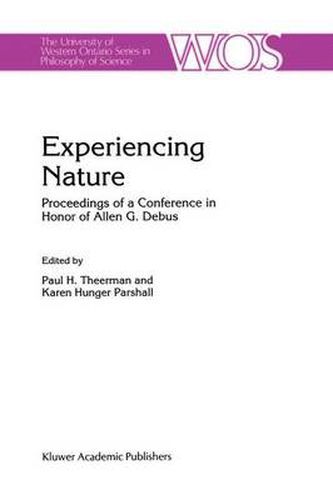Readings Newsletter
Become a Readings Member to make your shopping experience even easier.
Sign in or sign up for free!
You’re not far away from qualifying for FREE standard shipping within Australia
You’ve qualified for FREE standard shipping within Australia
The cart is loading…






This title is printed to order. This book may have been self-published. If so, we cannot guarantee the quality of the content. In the main most books will have gone through the editing process however some may not. We therefore suggest that you be aware of this before ordering this book. If in doubt check either the author or publisher’s details as we are unable to accept any returns unless they are faulty. Please contact us if you have any questions.
This volume, honoring the renowned historian of science, Allen G Debus, explores ideas of science - “experiences of nature’ - from within a historiographical tradition that Debus has done much to define. As his work shows, the sciences do not develop exclusively as a result of a progressive and inexorable logic of discovery. A wide variety of extra-scientific factors, deriving from changing intellectual contexts and differing social millieus, play crucial roles in the overall development of scientific thought. These essays represent case studies in a broad range of scientific settings - from sixteenth-century astronomy and medicine, through nineteenth-century biology and mathematics, to the social sciences in the twentieth-century - that show the impact of both social settings and the cross-fertilization of ideas on the formation of science. Aimed at a general audience interested in the history of science, this book closes with Debus’s personal perspective on the development of the field.
Audience: This book will appeal especially to historians of science, of chemistry, and of medicine.
$9.00 standard shipping within Australia
FREE standard shipping within Australia for orders over $100.00
Express & International shipping calculated at checkout
This title is printed to order. This book may have been self-published. If so, we cannot guarantee the quality of the content. In the main most books will have gone through the editing process however some may not. We therefore suggest that you be aware of this before ordering this book. If in doubt check either the author or publisher’s details as we are unable to accept any returns unless they are faulty. Please contact us if you have any questions.
This volume, honoring the renowned historian of science, Allen G Debus, explores ideas of science - “experiences of nature’ - from within a historiographical tradition that Debus has done much to define. As his work shows, the sciences do not develop exclusively as a result of a progressive and inexorable logic of discovery. A wide variety of extra-scientific factors, deriving from changing intellectual contexts and differing social millieus, play crucial roles in the overall development of scientific thought. These essays represent case studies in a broad range of scientific settings - from sixteenth-century astronomy and medicine, through nineteenth-century biology and mathematics, to the social sciences in the twentieth-century - that show the impact of both social settings and the cross-fertilization of ideas on the formation of science. Aimed at a general audience interested in the history of science, this book closes with Debus’s personal perspective on the development of the field.
Audience: This book will appeal especially to historians of science, of chemistry, and of medicine.